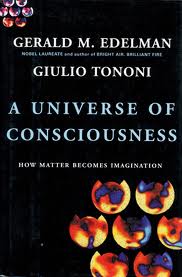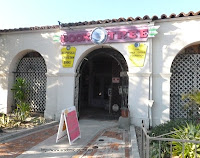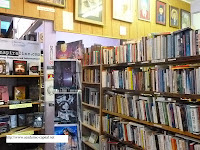The connections between matter and thought has been a debate
for hundreds of years. Thought is a higher level of conscious form grown out of
the natural development of human beings and their interaction with the
environment. Matter is that which physically creates the biological structure
by which thought can develop. Such matter developed out of our physical and
historical existence in a need to create higher probabilities of survival.
According to Darwinian perception, our very experience is constantly seeking
advantages and adaptations to our environment.
The book A Universe of Consciousness: How Matter becomes
Imagination by Gerald Edelman and Giulio Tononi delves into this matter and
consciousness connection. Like similar subject experts, they believe that neural
connections in the neocortex create pathways by which we take individual images
and connect them to develop consistent stories that both explain and predict
our environments. Those with higher
levels of neocortical activity also have higher levels of intelligence as they
are able to connect more experiences into a stream of consciousness.
More importantly, what we know as society comes from our
shared language that helps to represent images that further create similarity
in thought and conscious experience. The book does not move into this concept
but it can be intuitively drawn that a society is a collection of people with
shared streams of consciousness. It means that they have a shared string of
images in their past that make them a unified cultural entity-a society. When
these images and streams are significantly different, their sense of society
and hence collective conscious experience is different.
The brain makes connections within this neocortex depending
on its development and experience. The more experience the brain has the more
connections that are created to understand those experiences. New connections
are created through cell division that helps us to become more aware of both
patterns but also differences in our environments. The more successful we are
able to distinguish these differences the more successful our brains are in
creating pockets of knowledge through neural development.
The book also discusses the concept of the World Knot. In
its most basic form, the World Knot tries to untie the complex nature of how
individual subjective experience relates to objective reality. It is believed
that experimentation and research will be able to untie that knot someday.
However, even research and its methodology is subjective at its core due to its
cultural and developmental process. Perhaps the World Knot is really more of a
collective knot whereby multiple perspectives and critical thinking create a
more accurate understanding of our physical reality.
The book moves through the chapters of The World Knot,
Consciousness and the Brain, Mechanisms of Consciousness, Dealing with Plethora,
Untangling the Knot, and Observer Time. It is a collection and explanation of
modern neuroscience and its theoretical explanation of consciousness. The book is
written at a graduate level and a large bibliography for those seeking other
sources. It is coherent in its
development but technical in the language. It is not suggested that those
without a rudimentary understanding of psychology attempt to traverse its
meaning without a theoretical and biological basic understanding of human life.
Edelman, G. & Tononi, G. (2000). A Universe of Consciousness: How Matter becomes Imagination. NY:
Basic Books. ISBN: 978-0-465-01377-7
Price: $20
Pages: 250
Blog Ranking: 4.4
Author: Dr. Murad Abel



